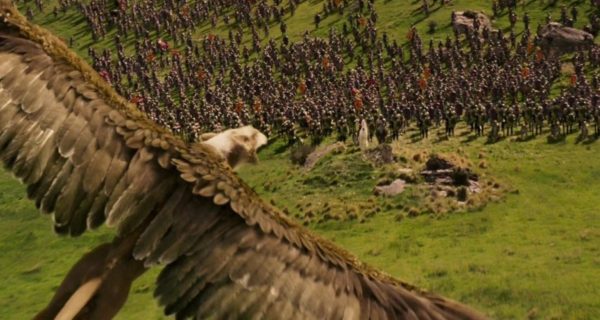I stand at my bedroom window, hands clasped against my chest, mouth hanging half-open, lungs barely collecting air. A heart-arresting battle is raging across the sloping green hill and in among the towering trees that make up my view. The summer air that coats everything visible is heavily smudged with dust and screams of pain, but the small army of heroes below me battles on unabated.
Their enemies circle and close around them like mud spreading onto the grass. Their banners flicker like serpents’ tongues, but the heroes’ faces show no fear. Their wounded leader lifts himself up, catching the dying rays of sunlight on his pale, angelic face. With both hands, he drags his sword up through the air and screams a battle cry in preparation for one final, desperate charge for victory and glory . . .
. . . and the epic battle dissipates as a piercing BEEP shatters the air, letting me know that the battery on my MP3 has just died.
When was I first inspired to write because of listening to epic music? Hard to say. But I can truthfully attest to the fact that without music, I would be writing very little. Music is like the heartbeats, voices and emotions that give life to my vague, skeletal-like thoughts, which eventually become stories. Without music, it would be hard for me to feel first what my characters will feel later. Without music, I could very well have a barren imagination.
Since my stories (I hope) are epic – or at least epic in my vision of them – it only follows that my choices of music are epic as well. By epic, I mean full-blown pre-, during, and post-battlefield drama, choirs that bellow and weep their singing, emotional vocalists, blends of different ethnicities in music style, strings that both chill and warm, and rousing percussions. I have had to scout for this type of music more than once.
The most obvious places to begin my searches were epic movie scores, and Harry-Gregson Williams, Howard Shore, and Hans Zimmer quickly took their places at the top of all my lists of epic music composers. Harry Gregson-Williams is well-known for his prolific scoring; in 2008, he had turned in over sixty different theatrical scores, with little signs of slowing down. Among others, The Chronicles of Narnia: The Lion, the Witch, and the Wardrobe, its sequel, Prince Caspian, and also the Crusading epic Kingdom of Heaven, starring Orlando Bloom, have stood out to me musically since the beginning of my writing craze. While Kingdom of Heaven, with its varying Middle-Eastern flavors, is my choice favorite of the three soundtracks, Gregson-Williams’ Narnian works are definitely not to be discounted.
In his “The Battle” from The Lion, the Witch, and the Wardrobe, the music encompassed in the stretch between 2:26 and 3:59 is one of the most sublime, epic, pre-battle anticipation moments I have ever listened to – but turn it up loud, because if it isn’t loud enough, you risk getting distracted and losing the exhilarating experience of it enveloping you. Also, his “Miraz Crowned” from Prince Caspian is powerfully dark and foreboding, with resonant choral work.
Howard Shore, writer, composer, and orchestrator of the music for The Lord of the Rings movie trilogy, was an obvious choice for me, considering what an avid fan I am of the movies. There are so many attributes to Shore’s music that can appeal: diversity in themes, a richness of cultural depth, a splendid array of vocalist highlights, powerful choirs. Shore was able to incorporate raw emotion into his work on The Lord of the Rings and produce something honed and beautiful out of it.
Especially captivating works include “Lothlorien” with beautiful, ethereal vocal work by Elizabeth Fraser, as well as “Evenstar” featuring the angelic Isabel Bayrakdarian. Winning epic songs would include “The Bridge of Khazad-Dum,” “The Prophecy,” “Helm’s Deep,” “Isengard Unleashed,” and “Minas Tirith,” to name a few. If you are a Tolkien fan, something especially appreciable about Shore’s The Lord of the Rings soundtracks is how text from and inspired by the books was brought into many of his choral pieces.
Hans Zimmer came to me last. While having composed the rowdy and swashbuckling scores for most of the Pirates of the Carribean movies, as well as other well-knowns including The Lion King, The Prince of Egypt, and Gladiator, Zimmer’s pensive, sorrowful, Asian-themed score for The Last Samurai was what won him a place on my list of favorite composers. “A Small Measure of Peace,” which closes the album at eight minutes long, is unbelievably riveting, serene and sorrowful.
The money I paid to purchase the album was a cheap price, in light of the genius of that one song. Aside from The Last Samurai, his “Roll Tide” from the soundtrack of Crimson Tide is another one of my all-time favorites: an epic that can be applied to the battlefield, or to the football field – whichever you prefer. These three composers held sway over my epic-music life for quite some time, but a recent discovery, thanks to a good friend of mine, added a fourth artist to my collection: Audiomachine. Their first album, Chronicles, has twenty-eight epic tunes, which have been mostly used for – you guessed it – epic movie trailers. “Creation,” “House of Cards”, and “Blood and Glory” are among my favorites from Chronicles.
All of these artists have proved themselves worth my investigating and my trial listens, and have established themselves as permanent members of “Team Help Mary-Faustina Write An Epic Novel.”If you are looking for a little epic-ness in your own creative life, I encourage you to give Harry Gregson-Williams, Howard Shore, Hans Zimmer, and Audiomachine a chance; and see if they don’t begin a battle in your backyard.

